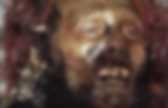

Filibuster (military) A filibuster or freebooter is someone who engages in an unauthorized military expedition into a foreign country to foment or support a revolution.
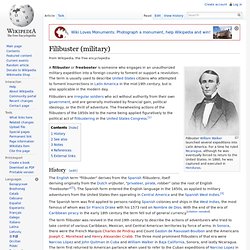
The term is usually used to describe United States citizens who attempted to foment insurrections in Latin America in the mid-19th century, but is also applicable in the modern day. Filibusters are irregular soldiers who act without authority from their own government, and are generally motivated by financial gain, political ideology, or the thrill of adventure. Neutrality Act of 1794. The Neutrality Act of 1794 made it illegal for an American to wage war against any country at peace with the United States.
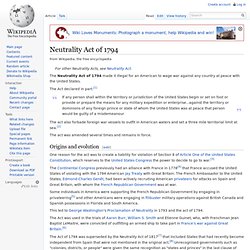
The Act declared in part:[1] The act also forbade foreign war vessels to outfit in American waters and set a three mile territorial limit at sea.[2] The act was amended several times and remains in force. Origins and evolution[edit] Manifest destiny. In the 19th century, Manifest Destiny was the widely held belief in the United States that American settlers were destined to expand throughout the continent.
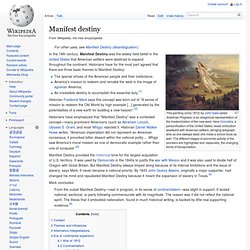
Historians have for the most part agreed that there are three basic themes to Manifest Destiny: The special virtues of the American people and their institutions;America's mission to redeem and remake the west in the image of agrarian America;An irresistible destiny to accomplish this essential duty.[1] Historian Frederick Merk says this concept was born out of "A sense of mission to redeem the Old World by high example [...] generated by the potentialities of a new earth for building a new heaven".[2] Merk concludes:
Gaston de Raousset-Boulbon. Gaston de Raousset-Boulbon Charles Rene Gaston Gustave de Raousset-Boulbon (5 May 1817, Avignon, France [1] - 13 August 1854, Guaymas, Sonora, Mexico) was a French adventurer, filibuster and entrepreneur and, by some accounts a pirate, and a theoretician of colonialism.
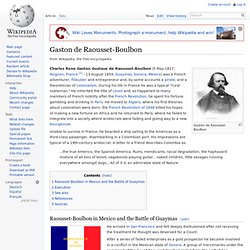
During his life in France he was a typical "rural nobleman. " Narciso López. John A. Quitman. Early life[edit] Born at Rhinebeck, New York in 1798, Quitman studied Classics at Hartwick Seminary, graduating in 1816.
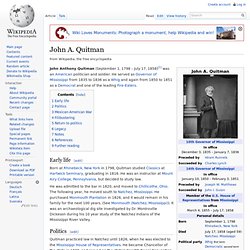
He was an instructor at Mount Airy College, Pennsylvania, but decided to study law. Fire-Eaters. "Fire eaters" redirects here.
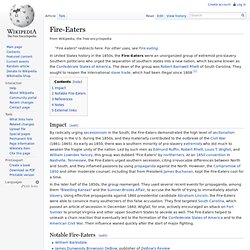
For other uses, see Fire eating. In United States history in the 1850s, the Fire-Eaters were an unorganized group of extremist pro-slavery Southern politicians who urged the separation of southern states into a new nation, which became known as the Confederate States of America. The dean of the group was Robert Barnwell Rhett of South Carolina. They sought to reopen the international slave trade, which had been illegal since 1808.[1] William Blount. Born to a prominent North Carolina family, Blount served as a paymaster during the American Revolutionary War.
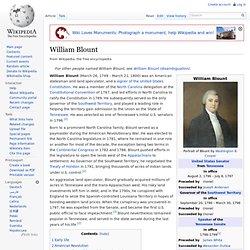
Augustus Magee. Biography[edit] Frustrated with his prospects, he played with Bernardo Gutiérrez de Lara's plan to support the Mexican War of Independence through an invasion of Texas from American soil.
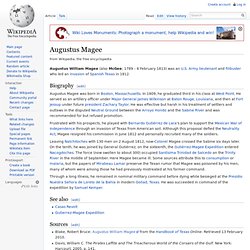
Although this proposal defied the Neutrality Act, Magee resigned his commission in June 1812 and personally recruited many of the soldiers. Through a long illness, he remained in nominal military command before dying while besieged at the Presidio Nuestra Señora de Loreto de la Bahía in modern Goliad, Texas. George Mathews (Georgia) Born in Augusta County, Virginia, Mathews was in early life a merchant and planter.
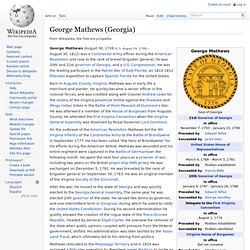
He quickly became a senior officer in the colonial forces, and was credited along with Colonel Andrew Lewis for the victory of the Virginia provincial militia against the Shawnee and Mingo Indian tribes in the Battle of Point Pleasant of Dunmore's War. He was afterward a member of the House of Burgesses from Augusta County.
He attended the First Virginia Convention when the Virginia General Assembly was dissolved by Royal Governor Lord Dunmore. On the outbreak of the American Revolution Mathews led the 9th Virginia Infantry of the Continental Army to the Battle of Brandywine in September 1777. He has been called "the hero of Brandywine" for his efforts during the American defeat. George Mathews was born on August 30, 1739 in Augusta County, Virginia to Anne (née Archer) and John Mathews. By 1779 he was granted a limited parole and permitted to live in New York City. George Rogers Clark. Early years[edit] Revolutionary War[edit] US Postage Stamp, 1929 issue designed by F.C.
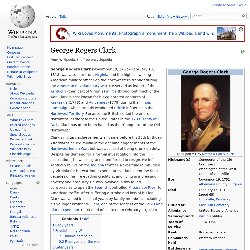
Yohn; George Rogers Clark recaptured Fort Sackville in the February 23, 1779 Battle of Vincennes without losing a single soldier Illinois campaign[edit] In July 1778, Clark and about 175 men crossed the Ohio River at Fort Massac and marched to Kaskaskia, taking it on the night of July 4.[14] Cahokia, Vincennes, and several other villages and forts in British territory were subsequently captured without firing a shot, because most of the French-speaking and American Indian inhabitants were unwilling to take up arms on behalf of the British. Clark's march to Vincennes—the most celebrated event of his career—has been often depicted, as in this illustration by F.
William Stephens Smith. William Stephens Smith (November 8, 1755 – June 10, 1816) was a United States Representative from New York. William A. Chanler. William Astor "Willie" Chanler, Sr. (June 11, 1867 – March 4, 1934) was a soldier, explorer, and politician who served as U.S. Representative from New York.[1] He was third son of John Winthrop Chanler (1826–1877) of the Dudley–Winthrop family and Margaret Astor Ward (1838–1875) of the Astor family.
Through his father, he was a great-great-grandson of Peter Stuyvesant[2] and a great-great-great-great-grandson of Wait Winthrop and Joseph Dudley. Through his mother, he was a grandnephew of Julia Ward Howe (1819–1910), John Jacob Astor III (1822–1890), and William Backhouse Astor, Jr. (1829–1892). Ira Allen. Ira Allen (April 21, 1751 in Cornwall, Connecticut – January 7, 1814) was one of the founders of Vermont, and leaders of the Green Mountain Boys; and was the brother of Ethan Allen. Biography[edit] The Great Seal of the State of Vermont Ira Allen was born in Cornwall, Connecticut, the youngest of six sons born to Joseph and Mary (Baker) Allen. In 1771 Allen went to Vermont as surveyor for the Onion River Land Company. Green Mountain Boys. This article is about the historical organization prior to the 20th century. For the modern military unit, see Vermont National Guard. The Green Mountain Boys were a militia organization first established in the late 1760s in the territory between the British provinces of New York and New Hampshire, known as the New Hampshire Grants (which later became the state of Vermont).
Headed by Ethan Allen and members of his extended family, they were instrumental in resisting New York's attempts to control the territory, over which it had won de jure control in a territorial dispute with New Hampshire. The Green Mountain Boys disbanded more than a year before Vermont declared its independence in 1777 from Great Britain "as a separate, free and independent jurisdiction or state". James Long (filibuster) Long Expedition. Gregor MacGregor. William Walker (filibuster)
Walker was born in Nashville, Tennessee, in 1824 to James Walker and his wife Mary Norvell. Chatham Roberdeau Wheat. Major Chatham Roberdeau Wheat Early life and career[edit] Parker H. French. Background[edit] A wood engraving of French by S. F. Baker from a Brady ambrotype The term "confidence man" first appeared in print in newspapers in the summer of 1849.[2] It described a New York man arrested for stealing watches or small sums by gaining trust only to betray it. Horace Bell.